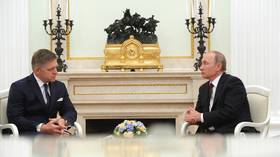Russia slams Twitter for breaking regulations as US tech giant ignores demands to delete thousands of posts with illegal material

By not deleting banned material, Twitter has ‘maliciously violated’ Russian law. That’s according to media regulator Roskomnadzor, which has revealed that the tech giant has refused to remove 2,862 posts with illegal content.
On Monday, the watchdog revealed that it had sent the California-based company a combined total of 28,000 deletion demands, with around 10 percent being refused. These include 2,336 posts on suicide, as well as 352 containing pornographic images of minors.
According to Russian law, violating the rules governing the restriction of access to illegal content could see the firm hit with a fine of up to 8 million rubles ($110,000), with that amount increasing to one-fifth of the company's annual revenue for a repeat offense.
Also on rt.com Russian Foreign Ministry says Twitter no longer independent social media, but a tool of 'digital diktat' under control of WestAs of February 1, according to new Russian legislation, social networks are now required to identify and block the forbidden content themselves, and have an obligation to take immediate measures to restrict access to prohibited material. As well as posts that call for terrorism, promote violence, and call for unsanctioned protests, the law also includes content with bad language.
This is not the first time Twitter has fallen afoul of Roskomnadzor in recent weeks. On Tuesday, the social network decided to remove 100 accounts it alleged were linked to the Kremlin, claiming that 69 of these had been deleted for "undermining faith in the NATO alliance," which raised eyebrows among journalists, with a further 31 banned for "targeting the United States and European Union." In response, the regulator demanded a list of all the affected users with explanations for why they'd been blocked. Among the suspended accounts include the Valdai Discussion Club, one of Russia's top think tanks.
Twitter was also slammed by Ministry of Foreign Affairs spokesperson Maria Zakharova, who called the social network "a tool of global digital diktat in the hands of the Western establishment" and no longer an "independent discussion platform."
While popular in the West, Twitter is only the eighth most used social network in Russia, behind the likes of International platforms YouTube (35 percent) and Instagram (31 percent), as well as domestic websites VKontakte (43 percent) and Odnoklassniki (31 percent).
Also on rt.com In fresh censorship, Twitter bans 'Russian' accounts it says are 'undermining confidence in NATO' amid rising tensions with MoscowWhile some see Russia's actions against Twitter as toothless, politicians have repeatedly threatened to outright block foreign social media firms that are perceived to discriminate against Russian outlets. In November, MP Alexander Khinshtein and influential Senator Alexey Pushkov proposed punishing social networks that display prejudice on the basis of nationality, language, or anti-Russia sanctions. If found guilty, the websites could be fined or even blocked entirely. The proposal came after Twitter took action against RT and other publicly-funded Russian media outlets, subjecting their accounts to a shadowban.
Speaking to Moscow-based news agency TASS last year, MP Anton Gorelkin explained that the proposed legislation would give the government the right to throttle a website's speed.
"Access restriction, which includes slowing down traffic, is intended as an extreme response against the blatant discrimination against Russian media outlets on foreign platforms," Gorelkin explained. "I have always been a proponent of soft power and an opponent of blocking, but the state should always have a hard option in reserve for particularly malicious violators of the law."
Think your friends would be interested? Share this story!













